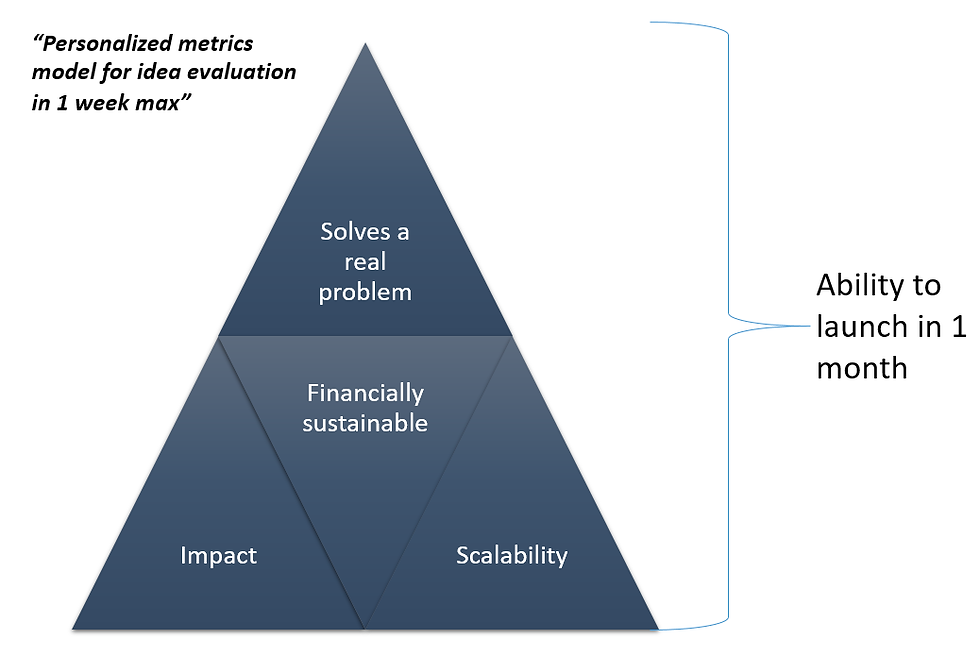So in my last post I discussed where my ideas came from. This post is intended to provide the initial metrics I use to evaluate the ideas with. If you do some research into idea evaluation, there is some great content on modelling your idea in detail (I.e. lean canvas) but there isn't as much information on the metrics you can use to perform an initial analysis of the idea/problem.
I will start with the problem I had with doing a detailed evaluation of my ideas. The issue I had was with the time it took. Doing a detailed evaluation of my ideas took approximately 3 weeks to begin with based on 4 days of time spent per week. That works out to about 3% of my time per idea (if you annualised that value)which was time I didn’t have. I also found that if the idea didn’t have legs I got a bit disillusioned as I felt I had wasted my time.
At the time I had about 80 ideas that I could potentially explore and I did the maths based on the above. If you work it out this would equate to spending 960 days on a full time basis or rather more than 2 and 1/2 years of my time. Something which would not be feasible.
So I formed a “personalized metrics model for idea evaluation in 1 week max” (Catchy title I know!). “Personalized” being the key word in the title as I needed to articulate the metrics which were important to me but at the same time time box my effort such that I can cover as much ground as needed.

My metrics were made up of 5 different metrics IN ORDER of priority
1. Solves a real problem
Ideas aimed at truly solving market / industry inefficiencies entice me. For example many ideas built on the principle of “sharing economy” (e.g. AirBnb, Bla Bla Car, Park at my house) are solving a previous industry inefficiency but similar concepts targeting other industries have failed because the concept wasn't targeting an identifiable problem and hence the market did not need a technology pull to advance its operations. In truth the easiest way to find an idea that solves a real problem is to come across one in your day to day work/personal life. For the purposes of this post we are talking about manufacturing an idea. 2. Impact The idea has to have sufficient impact on an industry / market to make the idea interesting. In order for me to focus on understanding the impact the idea may have, I started thinking about the idea all the time during the evaluation period to better understand it’s impact and to gauge my interest in solving this problem. Elevator pitch — what I found really useful was doing an elevator pitch after the initial analysis to see if I was passionate about solving the problem and to understand if I was able to articulate the impact the idea has. 3. Financially sustainable Simply put I had a few ideas which I thought were great but the analysis showed there was no revenue in them or that I would be in a perpetual negative cash flow situation. Whilst I don’t necessarily think one should focus on revenue all the time because that would have stifled some of the greatest innovations out there at some point it still becomes important. Just to clarify though — I don’t want the idea to make me rich but I feel any good idea should be able to bring revenue of its own such that the business can sustain its own costs without giving up huge amounts of equity/control to a third party. 4. Scalability I want a business idea which has large enough market potential such that the business is scalable. This is important because without Scale I wouldn’t have the challenge I want on my hands. Scale didn’t have to be immediate but at some point I want the opportunity to be able to grow the business significantly. Businesses that grow rapidly tend to also attract smart people, which would help ensure my business remains innovative. Scalability goes hand in hand with product market fit but as you grow your company its having this in the back of your mind that may help fuel your growth. 5. Ability to launch in 1 month This was a late addition but an important one as I wanted something I could potentially launch to test in 1 month. I felt that my ideas would only be realized if I could test them and this rule also meant that a few ideas which were out of my current skill set were not progressed further So there you have it — these were the 5 important metrics I used. If you take anything away it should be to spend some time to find your own personalised metrics, as this could differ based on your background / industry experience. I would love to hear of any metrics you use to evaluate your ideas or thoughts on the above.
Comments